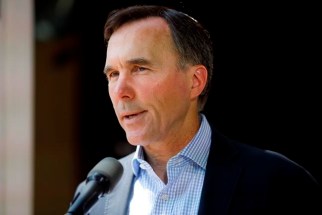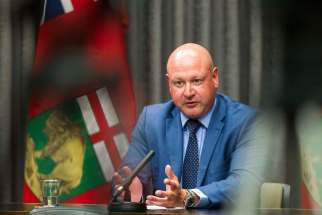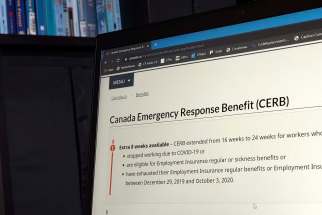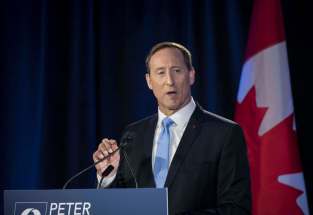Guaranteed basic income safety net for all
Read this article for free:
or
Already have an account? Log in here »
To continue reading, please subscribe:
Monthly Digital Subscription
$0 for the first 4 weeks*
- Enjoy unlimited reading on winnipegfreepress.com
- Read the E-Edition, our digital replica newspaper
- Access News Break, our award-winning app
- Play interactive puzzles
*No charge for 4 weeks then price increases to the regular rate of $19.00 plus GST every four weeks. Offer available to new and qualified returning subscribers only. Cancel any time.
Monthly Digital Subscription
$4.75/week*
- Enjoy unlimited reading on winnipegfreepress.com
- Read the E-Edition, our digital replica newspaper
- Access News Break, our award-winning app
- Play interactive puzzles
*Billed as $19 plus GST every four weeks. Cancel any time.
To continue reading, please subscribe:
Add Free Press access to your Brandon Sun subscription for only an additional
$1 for the first 4 weeks*
*Your next subscription payment will increase by $1.00 and you will be charged $16.99 plus GST for four weeks. After four weeks, your payment will increase to $23.99 plus GST every four weeks.
Read unlimited articles for free today:
or
Already have an account? Log in here »
Hey there, time traveller!
This article was published 17/08/2020 (1939 days ago), so information in it may no longer be current.
Bashing the Canadian Emergency Response Benefit program has become the political equivalent of low-hanging fruit.
Virtually all of Canada’s Conservative premiers have labeled CERB as a “disincentive to work,” while polls show majorities in Quebec, Alberta, and B.C. support shutting the program down.
Even premiers of Manitoba and Ontario — where polling show majorities who want to keep the program — blame their economic woes on the $2,000-a-month benefit paid to employees unemployed due to the novel coronavirus pandemic.
It’s not like CERB is above criticism.
Take the fact that if an employee makes $1,000/month they don’t qualify for a “top-up” to CERB-levels. Or the fact CERB payments are taxable and the Canada Revenue Agency is going to have one long list of people who owe next year. This is not to mention the number of times I’ve heard stories of somebody lying to get CERB or some “lazy” millennial student improperly using it.
Many love to blame CERB. Manitoba Premier Brian Pallister, for example, has regularly blamed the slow-to-recover economy on the program.
The problem is CERB doesn’t provide a disincentive to work, the COVID-19 pandemic does.
People who deserve to be on CERB are most often working front-line, low-wage, life-risking jobs. Apparently, it’s OK for professional athletes to “opt out” of work when it comes to family or fear of death but it is not OK for someone who works in a grocery store.
So, this leads to the main problem: politics.
The CERB saved Canada’s economy. Period.
It allowed people to pay rent, keep businesses open, and stave off the brutal shock of the worst economic downturn in generations.
Without CERB, nearly a quarter of the country would have suddenly defaulted on loans and rent, overwhelmed social programs and resources, used up their limited time on EI and, eventually, accessed welfare. With a stagnant economy and skyrocketing private and public debt, this would instigate a widescale, economic meltdown with nowhere to hide.
Don’t be fooled: this may still happen, but a slow burn is much better than overnight.
The CERB was never meant to be forever (see the word: emergency). Something has got to be done to reduce its impacts as more than 8.5 million Canadians have accessed CERB, and the bill is coming in at more than $80 billion to taxpayers so far.
Add in another $260 billion or so in COVID-19 costs (including a $45-billion wage subsidy program) and Canada’s deficit since the pandemic started is more than $340 billion (and is expected to surpass $1 trillion next year, for the first time in history).
Clearly, a lot of money is going out the government’s doors and much less is coming in.
Meanwhile, the government is planning a hastily-organized transition of millions of Canadians onto employment insurance, but this is just a Band-Aid. People will use up their weeks and then what? Will work even be possible?
With more cases of COVID-19 every day, how much longer until a shutdown or partial shutdown is necessary? It’s looking more and more looking like a long-term, systemic solution is needed the longer the pandemic continues.

An answer may have been offered this week by Winnipeg MP Leah Gazan.
In a private member’s motion (M-46), Gazan has called for CERB to be converted into a guaranteed livable basic income.
It would mean those most marginalized by an economy never have to worry about being without. It would act as a safety net, not a luxury ride, for those who access it. It’s also adjustable to regional area and cost-of-living.
A universal income would mean basic costs for life would be guaranteed and those who need to transition into new employment have time to train and get experience.
It also means those in poverty — most often seniors, the disabled, and those who have experienced discrimination — have opportunity.
Unlike CERB, a guaranteed livable basic income could also be integrated with the tax system to avoid exploitation and support public services and ensure it is delivered effectively and with the same benefits CERB currently provides the economy.
NDP private member’s motions rarely convince anyone in government, but Gazan’s idea has secured more than 23,000 signatures on a petition, as of Monday.
It’s an idea for all, in a time when we need all of us to pull our weight.
niigaan.sinclair@freepress.mb.ca

Niigaan Sinclair is Anishinaabe and is a columnist at the Winnipeg Free Press.
Our newsroom depends on a growing audience of readers to power our journalism. If you are not a paid reader, please consider becoming a subscriber.
Our newsroom depends on its audience of readers to power our journalism. Thank you for your support.











